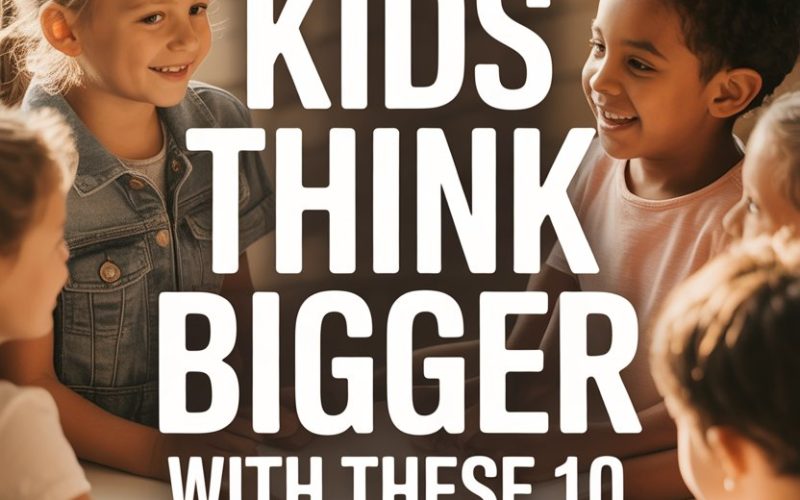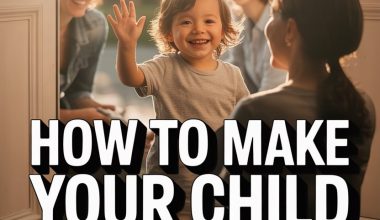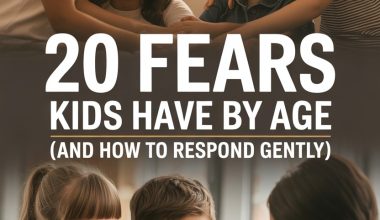Ever watched your child stare into a fridge for eight full minutes, hoping a different snack will magically appear?
Kids are naturally curious and creative—whether it’s snack choices or inventing rules for Monopoly that would confuse a tax lawyer. Still, sometimes that big, stretchy thinking can use a gentle nudge.
If you want your child’s imagination and confidence to grow beyond “what’s for tea?” and “do I have to wear shoes?”, the right questions can open up their world.
Here are 10 conversation starters that help children dream wildly, think critically, and—dare we say—change the world (or at the very least, get dressed before noon).
1. What problem in the world would you fix if you had a magic wand?
Some kids will zero in on world peace or clean oceans. Others might tackle the perennial injustice of broccoli on dinner plates. Both count.
Asking about real-world problems encourages empathy, introduces the idea that big issues can be changed, and gives you a peek into your child’s priorities.
According to Harvard’s Project Zero, kids who are invited to consider real-world dilemmas develop stronger problem-solving and social-emotional skills. Plus, their answers might just give you hope for the next generation.
2. If you could invent something to make life better for others, what would it be?
Forget the next TikTok. Ask about the next big thing that matters.
Children love imagining inventions, and this question gives them a legitimate reason to channel their inner mad scientist.
Whether it’s a robot that does the washing up or shoes that tie themselves (Nike, take note!), you’re encouraging your child to look for solutions, not just spot problems.
Innovation starts with wild ideas—the kind that only children can dream up before the world tells them what’s “realistic.” And if their invention is a device that launches peas into outer space, well, at least they’re thinking.
3. Who is someone you admire, and what would you ask them if they were here?
Heroes aren’t just for comic books. From Malala Yousafzai to David Attenborough, even the family’s favourite teacher, talking about role models helps children identify qualities they value.
Having your child imagine a conversation with someone they admire builds aspiration and self-reflection.
According to child development expert Dr. Michele Borba, kids who talk about role models are more likely to develop resilience and a sense of purpose.
It also gives you a golden opportunity to ask: “What would you do if you had their superpower (besides changing the Wi-Fi password)?”
4. What’s something you’re curious about that you’ve never learned at school?
Schools are brilliant, but sometimes the syllabus leaves out gems like “Why do we hiccup?” or “Can you teach a parrot to whisper?”
Encouraging kids to chase curiosity outside the classroom shows that learning is a lifelong adventure, not just a nine-to-three job.
The Royal Society of Arts found that children who feel free to pursue their own interests develop greater motivation and self-direction.
So the next time your child asks how jelly is made or whether clouds have names, resist the urge to sigh—ask them what they think, and enjoy the rabbit hole together.
5. If you could travel anywhere in time or space, where would you go and why?
Annoyed by the price of petrol? This question doesn’t cost a penny.
Letting children imagine time travel or intergalactic journeys stretches their understanding of history, science, and even empathy (“Would you take a dinosaur as a pet, or visit yourself as a toddler?”).
It’s also a safe way for them to explore what-if scenarios without needing a passport. (Or, mercifully, packing.)
The Institute of Imagination suggests that “mental time travel” helps kids weigh decisions and consider cause and effect—skills that come in handy when negotiating bedtime.
6. What’s the bravest thing you’ve ever done?
Forget capes and leaping off furniture. Bravery takes many forms: apologising to a friend, trying a new food, admitting when you’re scared.
Prompting your child to reflect on their own courage builds self-esteem and resilience.
According to psychologist Dr. Lisa Damour, talking about moments of bravery—even small ones—helps children recognise their inner strength and prepares them for bigger challenges ahead.
Just don’t be surprised if their answer involves standing up to broccoli. That stuff is intimidating.
7. If you wrote a book or made a movie, what would it be about?
Every child is a storyteller, even if their narratives sometimes wander off course (or involve superhero cats).
Invite them to describe their plot, setting, and characters. This not only boosts creativity but also literacy skills.
The National Literacy Trust reports that children who create their own stories or scripts develop better language and comprehension abilities.
And if you end up hearing about a film where cheese saves the world, don’t worry—Hollywood has made stranger things.
8. What’s a new skill you’d like to learn, and what’s stopping you?
Trying new things is scary. Admitting what’s in the way? Braver still.
This question helps children identify their interests and obstacles, while giving you a chance to offer encouragement (or, when they say “skydiving,” a gentle redirection toward “trampoline lessons”).
Psychologists agree that helping kids set small goals and tackle small barriers is one of the best ways to teach perseverance.
Sometimes the biggest hurdle is just finding the confidence to start. Or getting the Wi-Fi to cooperate.
9. If you could swap places with any living thing for a day, who or what would you be?
Would they become a soaring eagle, a racing car driver, or the family dog (“He gets the best snacks”)? This question nurtures empathy and perspective-taking—key ingredients for emotional intelligence.
Researchers at the Yale Center for Emotional Intelligence highlight that kids who practise seeing the world through someone else’s eyes are more likely to grow into kind, thoughtful adults.
Be prepared, though: they might choose to be you for a day, just to see why adults are always tired.
10. What would you do if you knew you couldn’t fail?
Every grown-up could use this question too—preferably before their third cup of coffee.
Encouraging children to imagine a world without failure helps them think big and take risks, at least in thought. It’s a gentle reminder that great leaps (in science, art, or even playground politics) start with “What if I just tried?”
Stanford research on growth mindset shows that kids who are encouraged to see failure as a stepping stone, rather than a dead end, become more resilient and motivated.
It also gives you a chance to share those legendary tales of your own less-than-perfect childhood attempts—like that time you tried to build a treehouse with nothing but string, tape, and optimism.
Small Questions Make Big Thinkers
Raising a big thinker doesn’t require a PhD, a home laboratory, or shelves lined with encyclopedias (but if your kid is stacking encyclopedias, you might want to check on the family cat).
Simple, open-ended questions can transform dinner table chit-chat into the start of something extraordinary.
You’re not just passing the peas—you’re helping your child realise that their ideas matter, their voices count, and their dreams deserve to stretch as far as they can imagine.
Next time you’re together—stuck in traffic, doing the dishes, wondering if socks actually eat each other in the wash—try asking one of these questions. Then buckle up for where the conversation goes.
Chances are, it’ll be somewhere bigger than either of you expected.




